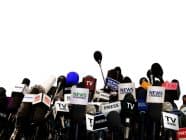Why do countries feel the need to own a news channel? To inform their citizens about the world, or to inform the world about their citizens?
A seminar organized by the BBC World Service, the Reuters Institute for the Study of Journalism and the BBC Academy on 4 November 2013 looked at the roles and the functions the new wave of state funded, global broadcasters such as Al Jazeera and China’s CCTV are taking on today.
This article summarizes some of the main discussions and arguments.
Traditionally, countries reached out to other countries through radio: think Voice of America or the BBC World Service. But now there are several countries setting up international broadcasters without ever having had a national radio service, and they are often broadcasting in a language that is not their own.
Stewart Purvis, professor of television journalism at London’s City University, who chaired the debate said we are now seeing “the old Cold War powers and a host of new global powers fighting a global battle for influence.”
The seminar looked at the key plays: Russia Today, now renamed RT, China’s CCTV, All Jazeera’s English and Arabic Service, Germany’s Deutsche Welle, Euro News, France 24 and Iran’s Press TV.
All these channels originate in state and public sector. Most get some state support.
The first question was the obvious one. Just why do governments spend so much on broadcasters.
The answer came from Joseph Nye, the distinguished political scientist who first coined the phrase ‘soft power’ in 1990. Nye believes that success on the world stage today means getting your story heard.
“Today, it’s not just whose army wins but whose story wins,” he said in a pre-recorded video that was broadcast at the seminar.
Narrative becomes important, but the strength of your narrative depends on credibililty. If you are not credible, no one believes your narrative. Propaganda, as a blunt instrument, is no longer of use. “The ability to establish credibility in the Information Age is critical,” said Nye.
Individuals, groups, a rock star, someone like Bono, develops soft power and credibility, various NGOs like Oxfam can also grow very powerful in this arena. Governments must compete with these agencies and with each other to push out their narrative. Some smaller countries, such as Norway and Singapore are very good at it. Larger countries often struggle with the issue of credibility worldwide: even the credibility the US has on the world stage comes from institutions like Hollywood and Harvard, rather than the government.
CCTV, which received $7 billion from the Chinese government in 2009, broadcasts in Chinese, English, Spanish, Russian, Arabic and French, and has an emphasis on reporting from Africa, where China is investing heavily in infrastructure and agricultural products.
Jianing Shen, Europe bureau chief of CCTV told the seminar that the station has 70 foreign bureaus with 446 staff of which 157 are local hires.
The station does report with some credibility, Dr Xiaoling Zhang, head of contemporary Chinese studies at the University of Nottingham’s China campus at Ningbo pointed out that the station reports on Africa quite robustly, and covers issues of human rights, democracy and elections. But it is not as effective at covering China, and to gain credibility, a country does have to cover its own country’s politics in an open manner.
RT, which broadcasts in 3 languages: English, Arabic, Spanish, received $ 300 million government subsidy in 2012 has clashed with the British broadcasting regulator Ofcom over its output. Ofcom has criticized the station for bias: Russian president Vladamir Putin has said openly that RT reflects Russia’s position but does not have to justify it: a stance that is at odds with Ofcom regulations, which says each broadcaster must in its own terms be impartial. Ofcom does not recognize the argument that the existence of a plurality of voices in a broadcasting space creates fairness.
Al Jazeera, which broadcasts in Arabic, English, Bosnian, Croatian, Serbian aims to offer a diversity of perspectives from under reported regions. The station is funded generously by the state of Qatar via the Qatar Media Corp. While the English service is seen as reasonably fair and unbiased, the station’s Arab channel was criticized heavily for biased reporting in covering uprisings in certain countries during the Arab Spring. The moment the state of Qatar tried to use its Arabic language service as a ‘hard power’ weapon, it lost credibility and several viewers in the Arab world moved to RT and the BBC Arabic service instead.
The BBC, the most established of all these broadcasters, has years of experience in carrying out this soft power. Peter Horrocks, director of the BBC World Service, says the broadcaster sees itself as representing “Britain’s values to the world.” These values include independence from government interference and free speech.
The clear message from the seminar is that national broadcasters who want to reach a global audience need to understand that they are competing with several other news providers. They must be seen as unbiased, competent, and fair to be taken seriously.
Social media has affected the importance and role of broadcasters. Research from Pew shows that 8 percent of Americans get their news from Twitter and 30 percent from Facebook, and these can link readers and viewers to a whole range of sources.
But broadcast still matters. When a story is contested, or the facts are unclear, audiences still tend to go back to traditional media, to check that something is true. Trusted broadcasters must do all they can to make sure they continue to earn this trust.
Photo credit: See-ming Lee / Flickr Cc
Tags: Al Jazeera English, Al-Jazeera, BBC, BBC World Service, media influence, political influence in media, politics in the media, Reuters Institute for the Study of Journalism, RISJ, RT, Russia Today, soft power














































